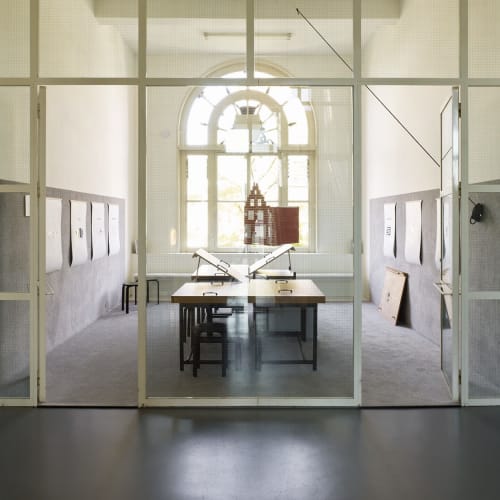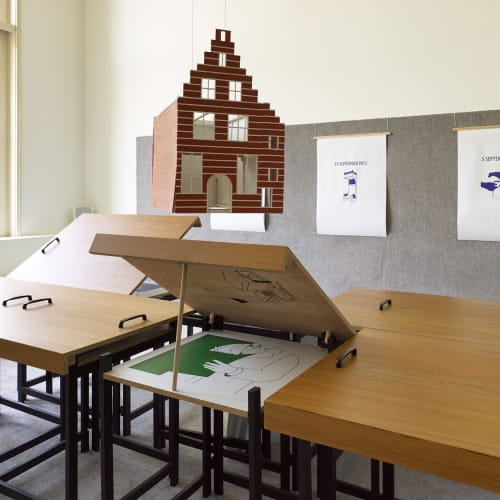For her project-based exhibition at Kunstinstituut Melly, artist Falke Pisano presents a new work that stems from her year-long research into the first savings bank in Rotterdam. Established in the early nineteenth century, the Savings Bank in Rotterdam (Spaarbank te Rotterdam) was created by a group of affluent residents and an emerging local bourgeoisie. Some of the people involved in this bank’s foundation were related to the Society for Public Welfare (Maatschappij tot Nut van ‘t Algemeen), which, for its part, had been established a few decades earlier, in 1784. The purpose of this foundation was to stimulate personal growth and self-discipline amongst working-class citizens and those who were financially underprivileged. The foundation saw the dissemination of “virtue” as a way to mend a divided society. The opening of Spaarbank championed this belief, too.
At the Rotterdam City Archive (Rotterdam Stadsarchief), Pisano had access to board-meeting minutes, reports, and correspondence pertaining to these institutions. She also regularly visited the Engelfriet family's website, which shares various kinds of histories about Rotterdam. These findings, along with further reading, introduced her to the advent of a “civil society” in The Netherlands at the turn of the eighteenth and nineteenth centuries. The artist explains that, through her research, she came across the so-called bourgeois “civilizing offensive” of the 19th Century, and that she was able to place the history of the Savings Bank in context. “I focused largely on the way common values and worldviews of the upper classes were conveyed through administrative language,” she says, “which I found future-oriented and patronizing, and, as such, disruptive and transformative of social relations and institutions.”
In her new work, not / to be / governed like that / by that, Pisano straddles the legacy and contemporary currency of such viewpoints and language around poverty prevention. The centerpiece of Pisano’s installation is shaped after a typical boardroom table. The tabletop is made up of seven separate panels, each with unique screen-printed illustrations underneath. These illustrations show actions, spaces, and moments of exchange, crisis, and control. While at first concealed, the illustrations are revealed during scheduled performances by Pisano, where she will use them to deliver different narrations. This also means that, formally, the artist’s performance involves overturning the sculpture’s main surface, and thus the purported function of a table connoting decision-making power.
The artist's performance consists of a three-part monologue; each part is performed once a month by Pisano between September and November. The first part of the performance focuses on the establishment of the Rotterdam Savings Bank in 1818. It speaks to forms of resistance and positions against notions of virtue, both then and now. The second part revolves around the national financial crisis of 1844, which sparked a public debate, eventually leading to the creation of new policy and a modern approach to personal and societal responsibilities. A key topic of conversation at the time was the bill proposed by Finance Minister Van Hall for an extra tax levy – avoidable if wealthy Dutch people provided a loan of 127 million guilders to the state by purchasing government bonds at 3% interest. The third part of Pisano's performance focuses on 1899, when the Savings Bank began to take steps towards expansion. The bank office was reorganized: teller counters were introduced to improve customer flow; banking services were no longer carried out by board members but by trained officials; opening hours were extended to eight hours a day. Optimization also began to appear in other institutions at the time. Whether it was the development of living rooms in homes or social welfare programs, spatial and legal arrangements in society were shaping institutions into managers.
The exhibition has been curated by Sofía Hernández Chong Cuy.



